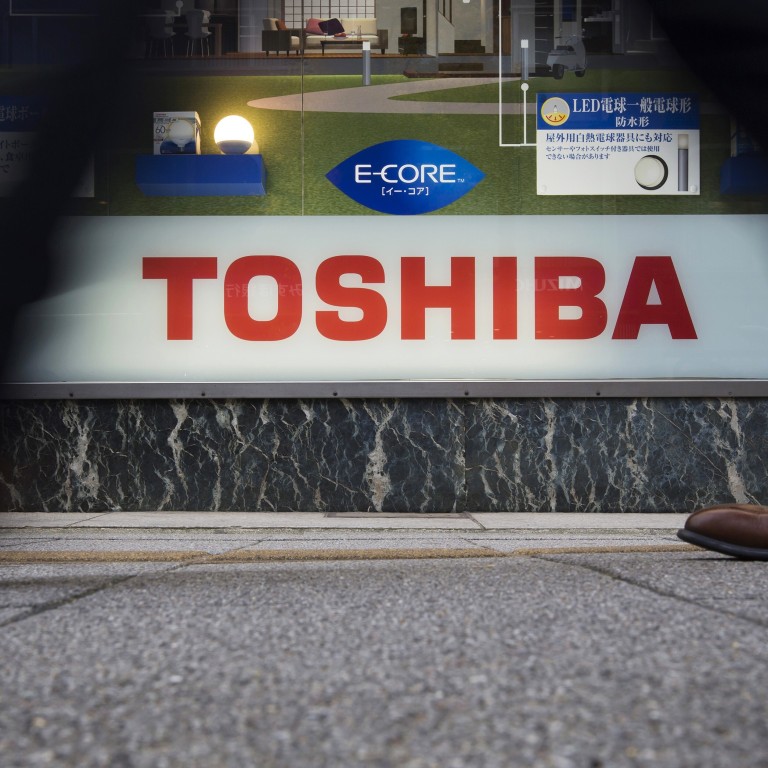
Japan’s Toshiba closing Chinese facility once considered ‘pearl of the Dalian Development Area’
- Three decades after being brought to Liaoning province by now-disgraced former politician Bo Xilai, the Japanese electronic giant is calling it quits in Dalian
- Industry experts point to a broader exodus of foreign firms looking to diversify their supply chains away from China
Japanese electronic giant Toshiba has confirmed it will cease production at its Dalian facility by the end of September, and the liquidation process will begin next month, ending its 30-year presence as an economic force in the city.
Hundreds of jobs will be lost, as the facility employs about 650 people.
“It was becoming difficult to continue operating the base these days following the termination and transfer of production … due to changes in the business structure of Toshiba Group, such as the sale of the TV and medical-equipment businesses,” Toshiba Corporation said in a statement to the Post.
“The decision was made to dissolve and liquidate Toshiba Dalian Co. Ltd as the current production of motors and broadcast transmitters will be discontinued and there are no plans to start up new production.”
Social media lit up with comments, photos and videos from facility employees, with many bidding farewell to the company where they have worked for more than a decade.
“Toshiba, once the pearl of the Dalian Development Area, is leaving,” one employee said on Douyin, the Chinese version of TikTok. “So many people have worked and lived here. We also got married and gave birth to kids after working for the company. It is so upsetting to see this. I hope all our Toshiba people will have a better life.”
Another said, “I have been with the company through thick and thin for 18 years – it was part of my youth, also my second home – so sad to leave.”
Toshiba said it will pay “adequate economic compensation to employees, with guidance from the government”, adding that the electronic giant “is developing a wide range of businesses in China and will continue to work towards further business growth in China”, without elaborating.
Japanese investment has contributed a lot to [Dalian’s] economy in the past two decades
Toshiba Dalian’s looming departure comes as a number of countries, including the United States and Japan, are seeking to reduce their dependence on China – a process that authorities in those countries dub “supply-chain diversification”, noted Liu Zhibiao, a professor of industrial economics at Nanjing University in Jiangsu province.
Additionally, electronic products from companies such as Toshiba now face strong competition from Chinese brands, and this has hurt demand for foreign brands.
“Meanwhile, as China is developing fast as the world’s second-largest economy, the cost of environmental protection, labour, and land use for foreign investment is also increasing, so foreign companies need to find new sources of profit,” Liu said. “These products are not very hi-tech, so they have to be very sensitive on costs.”
A Dalian-based businessman who works closely with Japanese manufacturers in the city said some have gradually been relocating to Southeast Asia since last year, and one reason cited to him is that it has got harder to recruit workers, particularly as costs keep surging.
“It is also because their shares in the domestic market are slumping fast,” said Mr Li, who asked that only his surname be given to protect himself and his clients. “But Japanese investment has contributed a lot to the local economy in the past two decades.”
Last year, the Japanese government launched an initiative aimed at “promoting investment in Japan to strengthen supply chains”, and 220 billion yen (US$2 billion) was earmarked for the effort in the country’s supplementary budget for last year.
Under the programme, approved companies receive financial support to help them relocate to Southeast Asia or build new domestic plants, with an aim of producing more critically important products and materials for Japan. Last year, 233 projects received such subsidies, according to data from Japan’s Ministry of Economy, Trade and Industry (METI), and an additional 151 projects were approved in July this year.
“I think the impact from the withdrawal of foreign investment is more psychological, because it will definitely have a negative impact on China’s efforts to lure more foreign investment, and it does not look good for local governments,” said Liu from Nanjing University.
“However, the real impact will not be that huge, because it is not difficult for Chinese domestic brands to replace them,” he added.
We expect the amount of foreign capital utilised in China to rise for the whole year
Liu Xiaonan, director for foreign investment at the National Development and Reform Commission, said he anticipated there would be “unfavourable factors” that may deter investment from multinational companies in the second half of this year, due to the pandemic.
“However, we expect the amount of foreign capital utilised in China to rise for the whole year, which may be better than we expected,” the director said during a media briefing on Wednesday.
From January to July, China’s actual use of foreign capital soared by 25.5 per cent, year on year, to 672.19 billion yuan. That was an increase of 26.1 per cent from the pre-pandemic 2019 level, according to the Ministry of Commerce.
Meanwhile, a Japan External Trade Organisation survey, released in March, showed that business confidence among Japanese companies operating in China worsened in 2020. But it also stated that, even though the ratio of companies maintaining profitability had fallen across all countries and regions, more than 60 per cent of Japanese companies remained profitable in China.
Additional reporting by Ji Siqi and Amanda Lee

